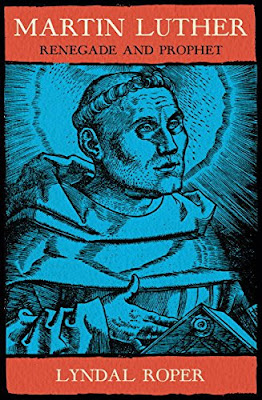Religion is used for ruin and hate and war.
But it isn't a two-step, black & white argument.
It is not a simple division of religion on one side, and secular humanism/atheism
on the other.
In the middle is non-puritanical religion. If you look at messianic, apocalyptic sects
they are usually puritan whether they be protestant or Islamic.
The atheist position is simply one of non-religion, a belief
in human goodness (but also a morally ambiguous position)
but without willing to paying any dues for it, or
respecting the historic culture whence those values truly originated.
Thereby taking a position merely of observer, of not taking sides,
unwilling to stand for or against anything, and hence
open to the rule by a Cromwellian Commonwealth or a
Wahhabist Caliphate simply because they refuse to defend
anything, because believing nothing means standing for
the position of nothing. This has been the position of Jews
since the Babylonian yoke.
Luther, Cromwell, and Osama Bin Laden's Islamic puritans have
in common the justification of the immanent fulfillment of messianic
apocalyptic prophecy. They believe they are
undoing the sin of man by annihilating what they deem
abominations, which involve division rather than
any unity, for they unite only in opposing something.
They can only stand against, they can never stand for anything.
They give no choice, unite with them or be at war with them.
So compulsion(tyranny), or war can only ensue.
Nothing is adapted, accepted, incorporated, or added,
the only thing that can happen is that culture, variety, people,
and customs are taken away. The Catholic culture, for all its
faults, was often not guilty of this. Rather than simply carrying out a
genocide policy as the protestants did in North America and Australia,
enduring examples of synthesis can be seen everywhere Catholicism
went (Mexico, England, South America)
It built on existing traditions and grew its own tradition as a result.
Islam did this up to a point. This is because initially it absorbed and synthesized
the Judaic Patriarchs and Christian desert-father knowledge, wisdom and traditions and
Greek science, geometry and philosophy.
But once it had gained a large cultural ascendancy in its vast expansions
after the prophets death, it soon began to stultify and turn to theories of doctrinal purity
which eroded its initial revitalizing potency. The minority Shiite represent
the remnant of the earlier, more tolerant, tradition, while
the majority, puritan, Sunnis have today seized the narrative.
Of course Catholicism and Shia have also been guilty of
episodes of doctrinal and dogmatic purity resulting in intolerance,
divisions, bloodshed, hatred and show 'trials'. But these instances
are also a result of reaction to the division in their faith, they have the same effect
from the same cause, but are not ultimately bound by any orthodoxy to
propagate these divisions and contradictions. False doctrines fail and
they are noted for their intolerance - of organic cultures, of women,
of hysterical bans on imagery, saints, statuary and ultimately Nature, or
mother earth. Shrines and relics, as much as they are derided as
wishful thinking, superstitions or idolatry, fill the need for ritual expression and
calendrical marking of the liturgical year, that is, they follow nature and
the seasons.
The puritans were the the self-proclaimed antithesis of the current orthodoxy.
Christian puritans frame themselves as Christ against
a corrupt priesthood. However, the Judaism that Christ
upended against were far more like Puritans themselves than
the Vatican Papacy. The route post-captivity Judaism
had taken was a law-obsessed priesthood, centered on
temple culture rather than pastoral, nature-based.
Neo-pagans are really neo-puritans,
who have a romanticised notion of the purity of nature more
than any actual respect for it.
Christ fits into this as the incarnate human-God, following
other saviours such as Mithras, Demeter (and countless others)
because he accepts and reveres the ground of nature- this is my blood
and body - why he is the Way through it. He never assumes
like an Olympian God that he is free from it, commanding
from above, and separate from earth, nature or us. He promotes the idea
that we are sons of both this world (earth) and the Almighty (the 'father').
Much of this was adjusted by theologians, which led to the reformation led by Augustinian monk turned rogue theologian, Martin Luther, and continued by other beneficiaries of monastic educations, notably Zwingli & Calvin, and continued by 'philosophers' such as John Locke.
But the reformation was only possible because
of the printing press, not because people were freed from tradition
by some grass-roots, collective enlightenment. This 'enlightenment' came from
the technology of Gutenberg, which was hardly collective and certainly not
a noble or spiritual human development. The technology of Gutenberg is
now being superseded in our time by the internet (non-print), showing that,
far from miraculous, Gutenberg's black-letter movable type was a chimera, different, but not unlike the half-animal faun-like idols of the pagans that Moses railed against.
This idolatry of script/font/typeface/calligraphy can be seen by the continued sacredotal insistence today of Arabic Abjad script (العَرَبِيَّة), and the Hebrew alpeh-bet(אָלֶף־בֵּית עִבְרִי). The representative of this biblioatry in the west, the inheritor of the German black-letter ("gothic") typeface

and the secular, modernist puritan hegemony, of the Swiss "Helvetica" typeface.






